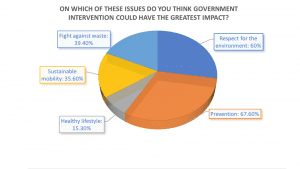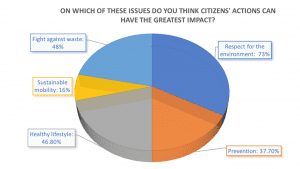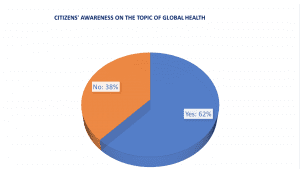
Mariano Votta and Ginevra Varallo from the Cittadinanzattiva/Active Citizenship Network discuss the importance of acknowledging health and wellbeing, environment, and social justice as fundamental pillars to achieving truly global health
In 1948 the World Health Organization defined health as ‘a state of complete physical, mental and social wellbeing and not merely the absence of disease or infirmity’. Today, after more than 70 years, the WHO definition is more relevant than ever if we think of the holistic approach to global health at the time of the health emergency that we have been experiencing for about two years.
The global pandemic confirms the need to recognise a broader scope of health that is no longer the result of few and circumscribed variables but the result of multisectoral and global factors, such as lifestyle, environment, and climate. The pandemic has turned the spotlight on issues that we have been talking about for decades, starting with the link between health and the environment, the close connection between the socioeconomic and educational levels of individuals, the psychophysical health status of citizens, and the growing weight of inequalities in the achievement of health goals everywhere. Now we must ensure that the containment of the pandemic, combined with the serious war scenarios in which we are immersed, do not turn off the spotlight on these issues.
The Global Health Charter can help resolve the global crisis
From these preconditions, the Italian NGO Cittadinanzattiva has started a new international project aimed at drafting a ‘Global Health Charter’, starting from a civic perspective, with the intent of building a holistic and conscious reading of health and contributing to providing effective solutions to the crisis and the health needs of each individual. More specifically, the Global Health Charter draws inspiration from both the experience of the European Charter of Patients’ Rights, promoted by Cittadinanzattiva about 20 years ago and the 2030 Agenda and the Universal Declaration of Human Rights.

The work began with a survey carried out by Cittadinanzattiva at the national level (Italy) and at the European level, thanks to its European branch Active Citizenship Network. This necessitated citizens and associations from 24 different countries to analyse their level of awareness and perception on the theme of global health and to succeed in delineating a perimeter of macro areas in order to develop the Charter in the most effective way possible. Access to health for all citizens (76.7%), fight against social inequalities (61.4%), psychophysical wellbeing (51.4%), equitable distribution of wealth (36.5%) and the search for sustainability (22%) are the five issues that European citizens indicate as priorities for a strategy to guarantee global health.

Most people surveyed also think that health in the world is mainly determined by: fair access to essential services which determine the physical, psychological, spiritual and economic wellbeing of each individual; level of inequalities; scientific research capacity of individual countries; access to correct, simple and transparent information; as well as behaviour aimed at the wellbeing of the entire community and not just the individual. Other key points mentioned included the recognition of health as a fundamental human right and the implementation of policies that fully implement this right. Equally, the willingness of the States to invest in health, culture, information, and prevention of risks associated with physical and mental illness.



More than half (56%) claim that the pandemic has decisively changed their personal priorities and the way they act. This was affected by the increased use of technology at multiple levels and for multiple purposes, increased awareness of global interconnections and the consequences of environmental change, greater attention to rules of hygiene and self-care, the environment and waste recycling. They also believe that the individual has a decisive influence on environmental protection (73%), while they attribute to the Institutions a great responsibility in ensuring the prevention of the psychophysical health of citizens (67.6%).
The Global Health Charter will be promoted by Cittadinanzattiva with the unconditional contribution of Janssen Italia, a pharmaceutical company of the Johnson & Johnson Group. The main intent of the Charter is to indicate the common commitments of institutions and citizens in the pursuit of the goal of global health defined by WHO as ‘a fundamental human right, in which health and disease are considered the result of processes that are not only biological but also economic, social, political, cultural, and environmental, transcending and exceeding the perspectives, interests and possibilities of individual nations’.
The charter aims to protect citizens’ rights
First of all, the Global Health Charter wants to be a useful tool to sanction and protect concrete and enforceable rights and commitments, both by citizens and institutions in every context and territory. The humanitarian implications caused by conflicts dramatically impose on us because war cancels every right. But perhaps also one of the most important lessons learnt from the COVID-19 pandemic when facing global events, no one can consider themselves excluded, safe or neutral. Each one of us plays a role in amplifying or reducing the impacts of the many factors that threaten the health of all and that of the planet: we might as well be active and aware citizens.
Speaking of awareness, there is still a large percentage of European citizens who are unclear about what is meant by global health, as many as 38% of the sample surveyed. This a fact not to be overlooked in light of the newly born Health Emergency Preparedness and Response Authority (HERA), created by the EU institutions in the aftermath of the COVID-19 pandemic, with the mission to prevent, detect and rapidly respond to health emergencies. Such an ambitious task that without the proper involvement of the citizens, being educated in global health will be very difficult to achieve.
Global health is an integrated approach of global research and action, which aims to improve the health of the whole of humanity from a multi-sectoral perspective and with an unavoidable correlation to biological, economic, social, political, cultural and environmental determinants. This is achieved by overcoming the perspectives and interests of individual countries, thus taking a holistic view and paying special attention to the most fragile and poor populations with the primary objective of reducing social inequalities as much as possible.
Mariano Votta and Ginevra Varallo
Cittadinanzattiva/Active Citizenship Network
https://www.activecitizenship.net/projects/410-2022-global-health-charter.html
https://www.facebook.com/activecitizenshipnetwork/
https://twitter.com/activecitnet
https://www.youtube.com/channel/UC2j0gkyJoV_58S8P33v6kow
This article is from issue 24 of Health Europa Quarterly. Click here to get your free subscription today.








